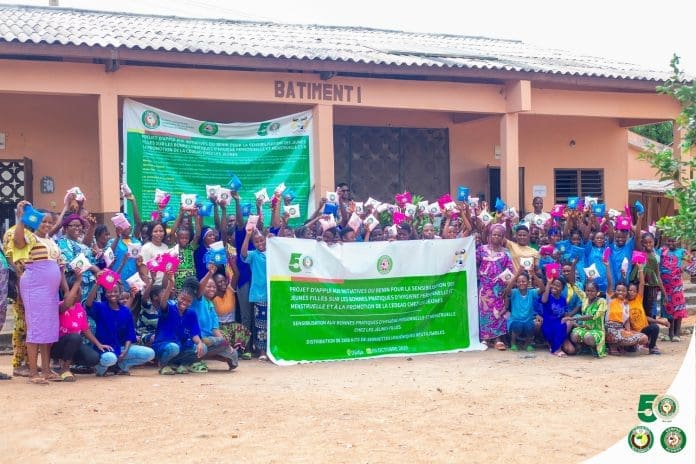The regional bloc distributed reusable sanitary kits and conducted menstrual hygiene awareness activities across two municipalities as part of a broader initiative to combat school absenteeism.
The ECOWAS Representation in Benin completed a comprehensive menstrual hygiene management campaign from September 25 to October 3, 2025, reaching more than 5,000 young girls in the municipalities of Zè and Djidja. The initiative included both awareness sessions and the distribution of reusable sanitary napkin kits, marking the latest phase of a project financed by the West African Health Organization (WAHO).
The campaign builds on earlier training sessions conducted from September 16 to 19, 2025, which prepared around twenty trainers from departmental services of Social Affairs and Secondary Education. These trained facilitators subsequently visited 10 general education colleges in Zè and 13 colleges and vocational training centers in Djidja, educating young girls about reproductive health, menstrual hygiene management, and the sustainable use of reusable products.
According to ECOWAS officials, the activities improved knowledge of proper hygiene practices while strengthening participants’ self-esteem and dignity. The regional body emphasized that such interventions contribute directly to reducing school absenteeism linked to menstruation, a persistent challenge affecting educational outcomes for girls across West Africa.
Ambassador Amadou Diongue, ECOWAS Resident Representative in Benin, conducted field visits to both municipalities on October 2 and 3, 2025, to monitor implementation and encourage participants. The visits brought together departmental directors of Social Affairs and Secondary Education, trainer teams, and heads of beneficiary institutions.
During his mission, Ambassador Diongue also paid courtesy visits to the mayors of Zè and Djidja. In Djidja, where the mayor was unavailable, his first deputy represented the municipality. These discussions provided opportunities to commend local authorities for their commitment and reaffirm ECOWAS’s dedication to grassroots cooperation.
The project, officially titled “Support for Benin’s initiatives to raise awareness among young girls on good personal and menstrual hygiene practices and the promotion of ECOWAS among young people,” represents part of WAHO’s broader investment in adolescent health across the region. An earlier phase of the initiative saw the handover of sanitary kits in Zè in June 2025, demonstrating sustained engagement with this issue.
ECOWAS officials described the campaign as evidence of the regional bloc’s commitment to reaching beyond institutions to directly serve citizens, particularly young people and girls. They positioned the work as addressing immediate health and dignity needs while advancing educational equity.
The emphasis on reusable sanitary products reflects both environmental and economic considerations. Unlike disposable alternatives, reusable kits reduce waste while providing longer term solutions for families facing financial constraints. Training components ensure girls understand proper maintenance and hygiene practices associated with reusable products.
Similar initiatives have been launched elsewhere in the region. ECOWAS introduced a comparable menstrual hygiene awareness project in Togo in August 2025, indicating a coordinated regional approach to addressing menstrual health challenges.
The Benin campaign aligns with what ECOWAS describes as its vision of an “ECOWAS of the People,” emphasizing inclusion and sustainable human development. Officials maintain that ensuring equal educational opportunities requires addressing practical barriers like menstrual insecurity that disproportionately affect girls’ school attendance and academic performance.
Source: newsghana.com.gh











